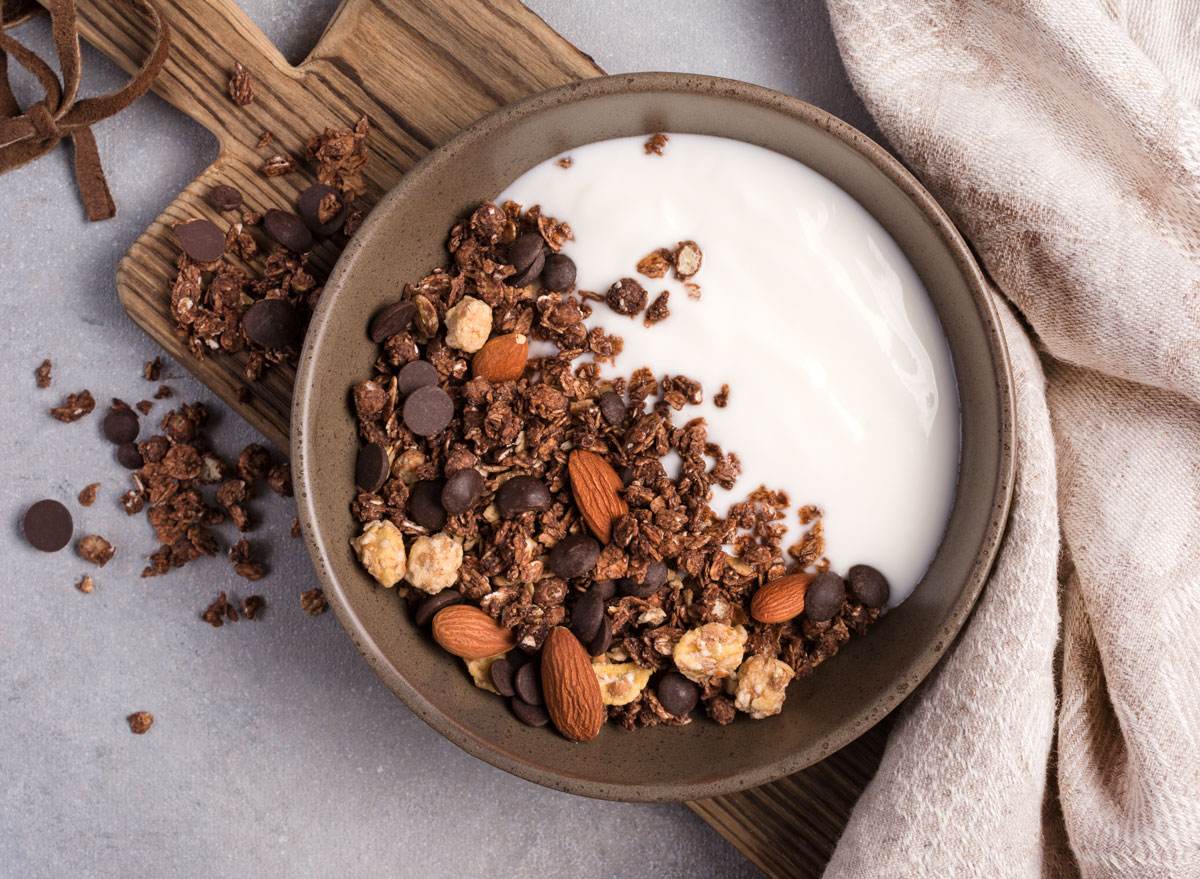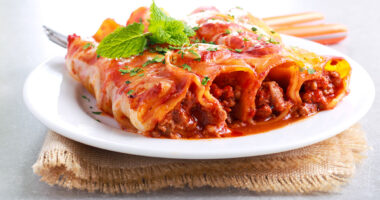The product recommendations in this post are recommendations by the writer and/or expert(s)
interviewed and do not contain affiliate links. Meaning: If you use these links to buy
something, we will not earn a commission.
Whether you’re layering it in a fruit and yogurt parfait, tossing it into an energizing trail mix, or sprinkling it onto homemade muffins, granola is as tasty as it is versatile. And depending on the brand you choose, granola can have a place in a balanced diet. But because it’s a processed food that can have any number of ingredients—both healthy and unhealthy—added to it, you need to be extra choosy about the bag you add to your grocery cart.
“Many granolas on the market are loaded with added sugar, saturated fat, sodium, and calories [to help] make the product have an amazing flavor and a long shelf life,” says Jaime Windrow, RD, a dietitian with Top Nutrition Coaching.
Instead, you’ll want your granolas will have “at least 3 grams of fiber and no more than 3 grams of saturated fat, 200 milligrams of sodium, and 8 grams of added sugar,” Windrow says. “Look for real, minimally processed ingredients — think: whole grains, nuts, seeds, fruits, such as almonds, pistachios, oats, quinoa, chia, hemp, and dried berries, apples,” Windrow adds.
While there are plenty of healthy granola options, unfortunately, many of the granolas at your grocery store don’t fit the bill. Below, find the worst granolas to avoid, and pick up a box of these 9 Best Healthy Cereals on Grocery Shelves, According to Dietitians instead.
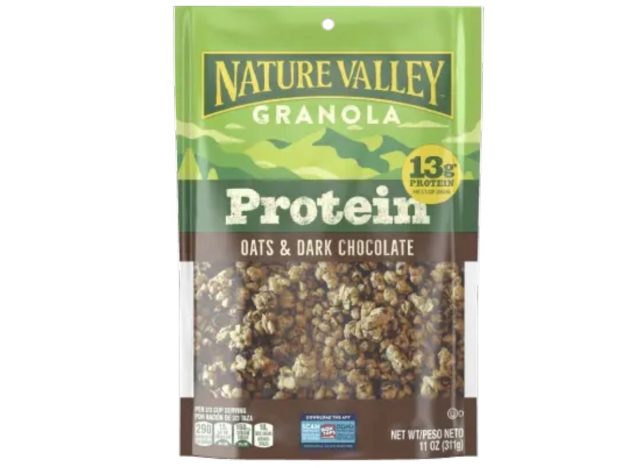

Per serving: 290 calories, 8 g fat (1.5 g saturated fat), 160 mg sodium, 41 g carbs (4 g fiber, 18 g sugar),13 g protein
Windrow points out that the second and fourth ingredients in this Nature Valley granola are sugar and chocolate, which totals 18 grams of sugar — that’s more than half of your daily value of the sweet stuff! FYI, the American Heart Association recommends no more than 25 grams of added sugar per day for women and no more than 36 grams for men. What’s more, this chocolatey granola is very processed with very few “real” ingredients from whole foods aside from oats, Windrow notes. So you won’t find any real fruits, seeds, and nuts in this pick.
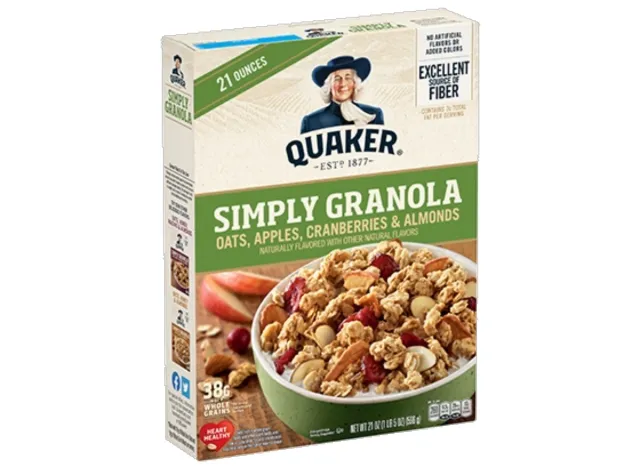

Per serving: 260 calories, 7 g fat (1 g saturated fat), 25 mg sodium, 49 g carbs (7 g fiber, 16 g sugar), 6 g protein
While this cranberry-studded granola does contain whole fruits and nuts, the second and third most abundant ingredient in this is sugar, totaling 16 grams per serving. If you’re starting your day with a bowl of this granola, you’re already sitting down to more than half of your daily recommended amount. Instead, dice fresh fruit and sprinkle a handful of almonds and walnuts over plain yogurt for a lower-sugar yet satiating breakfast.
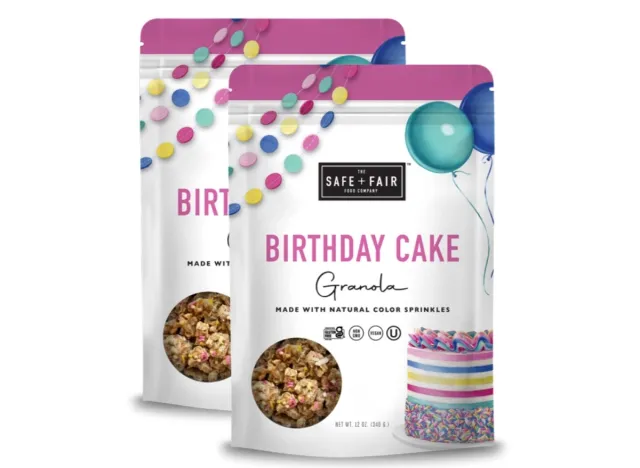

Per serving: 130 calories, 4.5 g fat (0.5 g saturated fat), 40 mg sodium, 21 g carbs (1 g fiber, 9 g sugar), 2 protein
“Gluten-free,” “vegan,” and “plant-based” — this granola bag is plastered with catchy health halos that don’t signify anything about this product’s nutrient density. “Beware of health claims on the package as it doesn’t mean the granola is actually healthy for you,” Windrow says. While at first glance, this granola may seem to fit Windrow’s parameters, if you look a little closer, you’ll see that the serving size is actually half of the usual. Many granolas list a serving size of two-thirds of a cup meanwhile Safe + Fair’s is only a third of a cup (which is super small). So if you pour two-thirds cup of this birthday cake granola into a bowl, you’ll be doubling all the numbers on the nutrition facts panel, meaning you’ll get a whopping 18 grams of sugar.
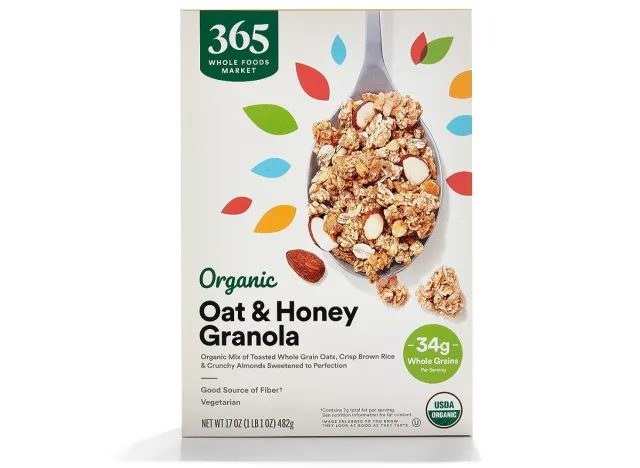

Per serving: 240 calories, 7 g fat (0.5 g saturated fat), 50 mg sodium, 40 g carbs (3 g fiber, 15 g sugar), 5 g protein
Just because it’s organic, doesn’t mean it’s nutritious. The organic label indicates the ingredients in this product have been grown organically, and does not imply anything about the product’s healthfulness. That’s why it’s so important to always check the ingredient list and nutrition label. The back of this granola’s box reveals that it has a high 15 grams of sugar per serving and the only note-worthy whole-food ingredients it contains are oats and almonds, Windrow says.
READ RELATED: 8 Best Bagels In NYC, According to Chefs
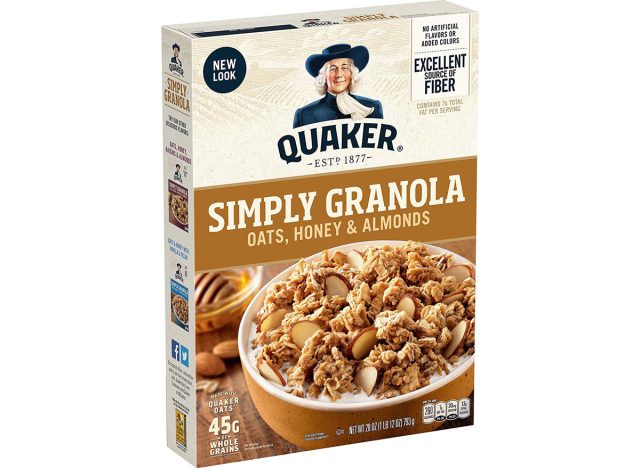

Per serving: 260 calories, 7 g fat (1 g saturated fat), 30 mg sodium, 48 g carbs (7 g fiber, 13 g sugar), 7 g protein
While this flavor doesn’t have as much sugar as the Quaker Simply Granola Oats, Apples, Cranberries & Almonds, it’s still more than Windrow recommends. The serving is just two-thirds of a cup, so if you pour more than that into your bowl or use sweetened yogurt, you’re sneaking even more sugar into your a.m. meal.
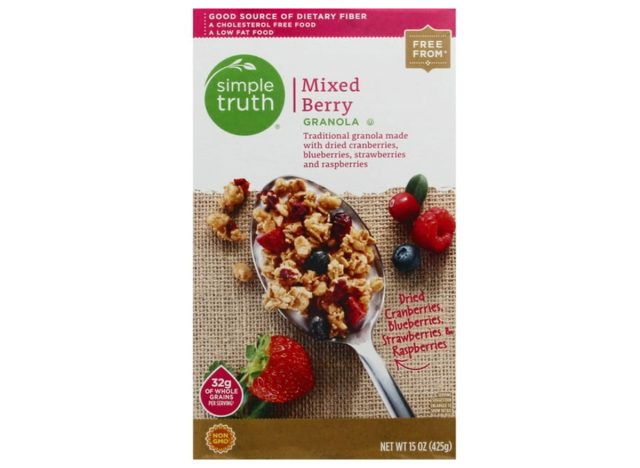

Per serving: 250 calories, 3 g fat (0 g saturated fat), 90 mg sodium, 53 g carbs (5 g fiber, 20 g sugar), 4 g protein
Kroger’s Simple Truth brand boasts that it carries “foods that can be enjoyed the way nature intended,” however, their mixed berry granola comes with 20 grams of added sugar. That’s just 3 grams shy of the amount of sugar in a KitKat bar! Instead, layer your Greek yogurt parfait with a medley of fresh or frozen mixed berries (like blueberries, raspberries, and blackberries) and add a handful of chopped almonds and walnuts for crunch.
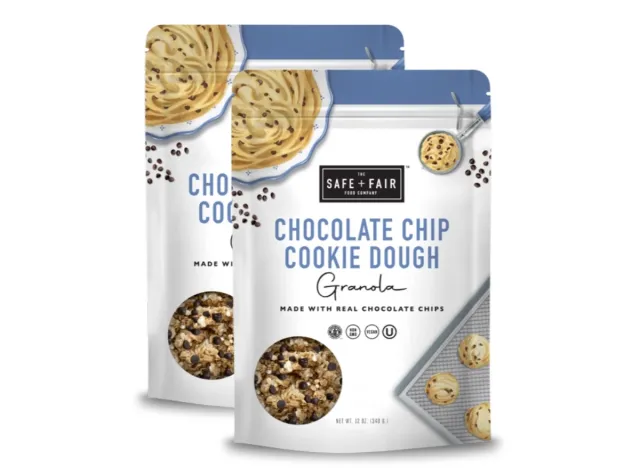

Per serving: 130 calories, 5 g fat (1 g saturated fat), 95 mg sodium, 20 g carbs (2 g fiber, 7 g sugar), 3 protein
Your favorite ice cream flavor turned into granola — sounds like a dream, we know. Here’s where we burst the bubble: This pick contains 7 grams of sugar and 95 milligrams of sodium for a measly third of a cup serving when most brands’ standard serving is double that. “Many brands will decrease the serving size to make the nutrition facts label seem like a healthier choice,” Windrow says. Don’t be fooled by Safe + Fair’s unfair serving sizes — just skip this granola altogether.
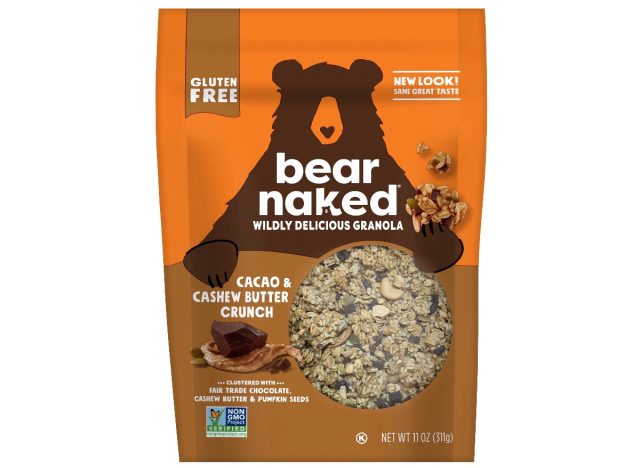

Per serving: 250 calories, 11 g fat (3 g saturated fat), 115 mg sodium, 34 g carbs (3 g fiber, 11 g sugar), 6 g protein
This chocolate cashew butter granola from Bear Naked is crafted with four different types of sugar. You’ll get 11 grams of sugar in a small half-cup serving, plus 3 grams of saturated fat, which comes out to 15% of your daily value. If you’re craving the nut butter-chocolate combo, sprinkle a tablespoon of cacao nibs and drizzle a tablespoon of cashew butter (or peanut butter) over plain Greek yogurt.
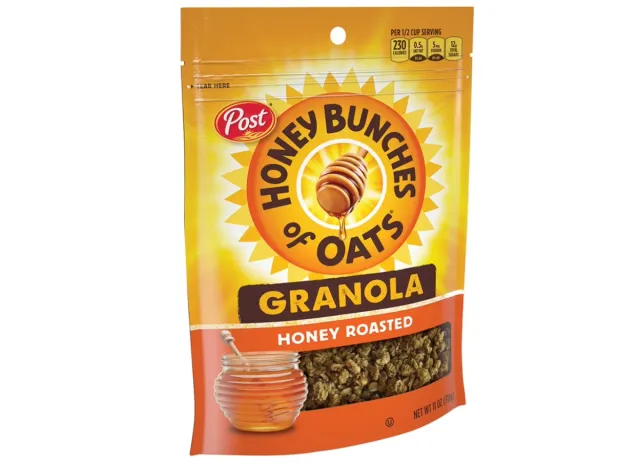

Per serving: 230 calories, 7 g fat (0.5 g saturated fat), 5 mg sodium, 40 g carbs (3 g fiber, 12 g sugar), 4 g protein
While not as high in sugar as many of the other products on our list, this Honey Bunches of Oats granola is still high in the sweet stuff, offering 12 grams per half-cup serving. And again, a half cup is a small serving. If you’re still craving the honey-laced crunch of these clusters, try using just a sprinkle of this — think: over a smoothie or in homemade ice pops.
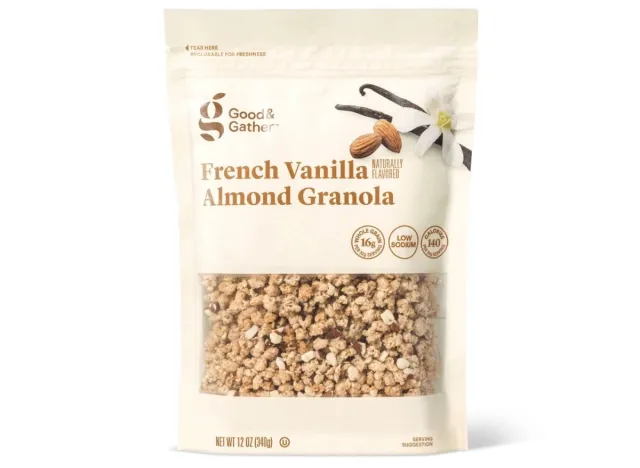

Per serving: 140 calories, 5 g fat (0 g saturated fat), 40 mg sodium, 23 g carbs (2 g fiber, 8 g sugar), 3 g protein
Another granola that downsizes its serving to make itself seem healthier, this granola from Target brand Good & Gather offers 8 grams of sugar per third of a cup. Translation: If you use two-thirds of a cup, you’ll take in a high 16 grams of sugar. It doesn’t offer much else than sugar in terms of nutrition, as the ingredient list just lists oats and almonds as the only whole-food ingredients. So you won’t get any fruits and seeds.

